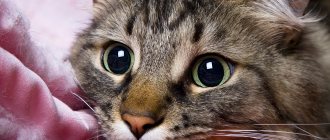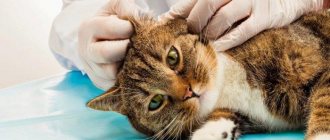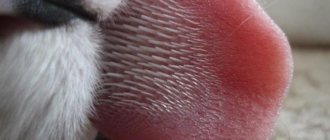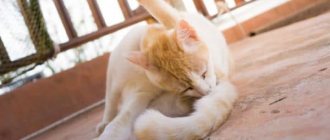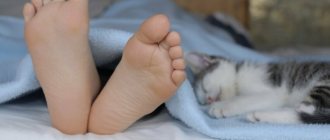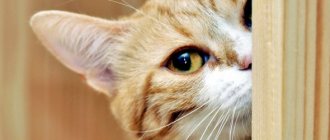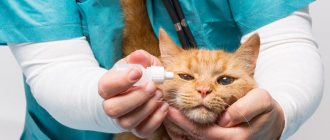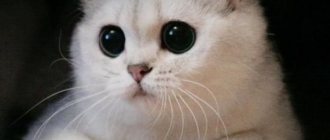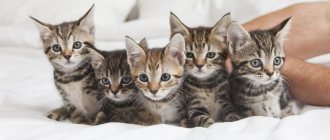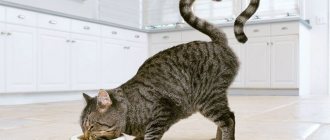- The main causes of poor appetite in cats
- If a cat doesn't eat well - reasons for sudden refusal to eat
- Viral infection as one of the reasons why a cat does not eat well
- Signal of a foreign body entering the digestive tract
- Inflammation of the stomach or intestines as one of the causes of poor appetite
- Poisoning as a reason why a cat eats poorly
- If your cat begins to eat little due to kidney failure
- Diseases of the teeth and oral cavity
- Pain syndrome and stress
- Emergency assistance before the veterinarian arrives
The main causes of poor appetite in cats
Cats by nature have a delicate internal organization. They are capricious and capricious, and unlike a dog, forcing it to do something against its will is very problematic. This also applies to food intake, for example, meaning dietary nutrition, which can be prescribed by a veterinarian as additional therapy for kidney failure, liver disease or disorders of the digestive system. Cats are picky creatures; they are capable of rejecting food offered by their owner that is not to their taste until they receive the coveted tasty morsel. But if there is a periodic refusal to eat and the owner notices that the cat eats very little, regardless of the food offered, you should be wary. This may be a sign of a systemic disease caused by a number of reasons that every cat owner should be aware of.
The dangers of not enough food for a kitten
An adult cat is able to survive for a long time without food or get by with a minimum of it. But for a small animal, nutritional deficiency can lead to serious problems. If a kitten does not eat anything or eats very little and poorly, this is fraught with:
- gastrointestinal diseases;
- anemia;
- pathologies of the liver and kidneys;
- breathing disorders;
- heart rhythm disturbances;
- developmental and growth retardation.
Of course, these complications occur when the animal eats poorly and eats little for quite a long time.
It happens that appetite disappears for just a few days, and then returns to normal. But if the kitten is thin and has not been eating well for a week or more, it’s time to sound the alarm.
© shutterstock
Signal of a foreign body entering the digestive tract
Most owners often encounter this problem, which is especially typical for playful cats of long-haired breeds. These could be small fragments of toys, small bones, or simply large accumulations of fur from the animal itself. The main signs for identifying this factor are attacks of vomiting that occur when drinking water and food, abdominal pain and difficulty defecating. With prompt diagnosis and timely removal of the foreign material, the pet will recover completely.
Inflammation of the stomach or intestines as one of the causes of poor appetite
There are several factors that can contribute to the development of inflammation of the stomach and intestines in cats:
- Parasitic infestation is the entry into the body of an animal of larvae of worms and protozoa, the development of which gives impetus to refusal to eat food and its partial rejection through the occurrence of a gag reflex or diarrhea
- If a foreign body enters the gastrointestinal tract and causes injury to it
- For uremic gastritis, which occurs with chronic kidney disease in cats
- Taking unbalanced food
- Regular stressful situations
- Allergic reaction to food or its components
- Diseases of the liver and pancreas
The pathological state of the factors described above is accompanied by complete or partial refusal to eat. It is quite understandable why the cat began to eat little - constant vomiting and soreness in the abdominal area do not give her the opportunity to taste even her favorite food. Therefore, when the first signs of the disease appear, you should consult a veterinarian, and in the case of previously diagnosed gastritis, adhere to a strict diet.
Why is the tray so important?
Often, kittens instinctively begin to use the litter box. The mother cat also teaches them this by burying excrement. Therefore, most likely, your pet will already be able to use it by the age of 3 months.
This is the most successful outcome of such an important matter. But the opposite also happens: the kitten categorically refuses to “go potty,” and the smell of cat urine is one of the most difficult odors to remove. In addition, this smell is very unpleasant, and if it gets on the carpet or upholstery of a chair or sofa, it can become almost eternal.
Poisoning as a reason why a cat eats poorly
Poisoning always takes place in an acute form, with a sharp refusal of the cat to eat and frequent bouts of vomiting, as well as other signs that are easy to distinguish upon visual inspection by the owner himself:
- Yellowness of visible skin appears
- Partial or complete absence of urination
- Convulsive contraction of the animal
- Arrhythmia and blue discoloration of visible skin
- Bloody discharge during vomiting and bowel movements
- Dyspnea
Confirmation of the diagnosis requires emergency intervention by a veterinarian and hospitalization of the pet in a veterinary clinic.
What to do?
First of all, you need to take a close look at your pet. If the symptoms accompanying loss of appetite indicate illness, an urgent examination by a doctor is needed. What you can’t do is procrastinate and self-medicate.
To alleviate the suffering of a pet caused by hormonal surges during the period of sexual heat (when there is no question of breeding offspring), the animal must be sterilized or castrated.
You cannot purchase a kitten under 3 months of age unless such action is justified by the death of the mother or her refusal to breastfeed. For an animal that is too small and cannot feed itself, purchase a cat milk substitute. The baby is sucked out of the nipple.
When it is not possible to purchase a substitute, and in addition there is no nursing cat that could become a wet nurse, you need to dilute cow’s milk with boiled water in equal parts and carefully, in small portions, try to feed the kitten, monitoring its condition.
Games, affectionate communication, and the calm voice of the owner will help alleviate the stress factor.
When a kitten appears in the house, at first it is better to leave dishes with drink and food near the place where the new tenant has settled. If the cat does not accept new food, you should find out from the breeders what the animal was fed before. When the pet returns to its usual food, part of the portion can be replaced, gradually accustoming the animal to the new diet.
Premium food
A kitten that does not eat anything for a period of time exceeding 1 day needs to be examined by a doctor. In the case when painful symptoms do not appear, and the kitten for some reason has stopped eating, you need to carefully try to feed it by hand. Food should be fresh and pureed. Drink the baby from a pipette or pacifier, gradually accustoming it to a bowl.
If your cat begins to eat little due to kidney failure
There are two types of kidney failure in cats - acute and chronic, which are characterized by refusal to eat. There is severe emaciation of the animal, frequent vomiting and urination, as well as a constant feeling of thirst. A common cause of this condition may be poisoning from flowers of the lily family. The condition of acute renal failure can be treated with timely contact with an experienced veterinarian. Resuscitation facilities and prompt implementation of treatment procedures will help restore your pet’s health in the shortest possible time.
How much does a cat weigh?
The weight of cats depends primarily on the breed, and if a Mae Coon cat weighs about 7 kg, and a Siamese cat weighs only 3 kg, then this is normal.
Not only an experienced veterinarian can determine whether a cat is malnourished. And although the table below is arbitrary, every owner can use it to correlate the physical condition of your cat.
Signs your cat is underweight:
- The cat looks bony. The ribs on an underweight cat can be easily felt when you stroke its sides, and the spine can also be easily felt when you move your hand along its back.
- With significant weight loss, the hind legs appear bony.
- Rib narrowing is present in all cats, but is significant in malnourished cats.
- Obvious loss of muscle mass. Even thin breeds of cats should have developed muscles, especially the muscles of the upper/shoulder spine.
Diseases of the teeth and oral cavity
A cat refuses to eat or eats very little - bad teeth or oral disease can be one of the common reasons for this behavior in animals. In this case, there is a complete or partial refusal to take favorite treats. The most common types of dental and oral diseases that can cause a pet to lose its appetite are:
- Excessive tartar deposits, which damage the gums, buccal mucosa and tongue, causing excessive salivation, chomping and painful sensations when chewing food. Putrid breath is the main sign of the disease;
- Poradontitis is inflammation of the gums and oral mucosa, which may precede the development of fistulas in the nasal cavity and orbit of the eyes;
- A viral infection that affects the oral mucosa, resulting in the formation of small ulcers that make it difficult to eat
Contacting a veterinary clinic will help to timely identify the initial stage of diseases through differential diagnosis and select the correct treatment for a full recovery.
Pathological causes
Why does a kitten's whiskers break: the main reasons and what to do
Don't delay visiting the veterinarian. A cat may not eat enough due to serious illnesses. In this case, lack of treatment will lead to the death of the animal.
Parasites
If the cat has lost a lot of weight, but eats well, then this is the first sign of infection with worms. The invasion is accompanied by nausea, perverted appetite, and bloody clots in the stool.
Parasites can cause loss of appetite in animals
Parasites are not always visible in feces, and therefore the owner may not be aware of the pet’s illness. Therefore, a person can see that a cat is losing weight, but eats well, but this may not be clear to him. In this case, you need to submit your stool for analysis, which will reveal the eggs of the worm.
Parasites can affect not only the intestines, but also all internal organs. In severe cases they are fatal. To get rid of worms, special tablets are used, which are given to the animal according to the scheme.
Oncology
Pets are also susceptible to malignant tumors. They appear especially often in cats that were sterilized late.
Important! Benign tumors also occur, but are rarely detected.
Any large neoplasm negatively affects the animal’s body and causes unpleasant symptoms - loss of appetite, lethargy, drowsiness and others.
Treatment and maintenance therapy in this case can only be prescribed by a veterinarian. Therefore, if a cat is not eating well and is losing weight, it is worth taking it to the clinic for examination. Only this will give a complete picture of the problem.
Diseases of internal organs
Poor nutrition and congenital problems can lead to various diseases. A diabetic cat is constantly thirsty and may refuse to eat.
If there are problems with the liver and inflammation in the genitourinary system, the animal has an appetite, but the cat will not want to eat. It will only cause discomfort.
Appetite may suddenly disappear during infectious diseases. With rabies, hydrophobia appears, i.e. the animal is thirsty, but does not start drinking. Gradually, excessive salivation, hypersalivation and other problems increase.
Important! Rabies cannot be treated and the animal must be euthanized. With distemper, a cat develops a high fever, frequent diarrhea and vomiting. In this case, the pet can only be helped if the disease is detected early.
Against the background of weak immunity, minor inflammatory processes may appear. For example, stomatitis is damage to the gums in the form of small ulcers. All this happens against the background of an exacerbation of the leukemia virus. With such a disease, the animal needs constant maintenance medications. Only they can extend the life of a cat. Viral enteritis is characterized by its rapid nature.
A sudden loss of appetite is accompanied by bloody diarrhea and vomiting, dehydration and death quickly occur. Therefore, you should not delay your visit to the veterinary clinic.
Only testing and examination will allow you to prescribe competent treatment that will save the animal’s life.
Pain syndrome and stress
Sudden onset of pain associated with bruises, scratches and damage to internal organs, for example, when fighting with cats during mating festivities. There is aggression towards others, the pet is depressed, reluctant to make contact, and hides in the dark. After identifying the causes of pain, which can be easily determined by an experienced veterinarian, comprehensive treatment is prescribed until the pet recovers completely. Stress motivators indicating the reason why a cat eats little include:
- Change of residence of owners and transportation of the animal
- The appearance of a new pet in the apartment
- Changing the filler in the tray
- Switching to another food
- During the reproductive period
The true reason for the lack of appetite can be determined by a competent veterinary clinic specialist, who will find the root cause of the pet’s reaction and prescribe the appropriate procedures.
Safe and dangerous symptoms
If your cat is healthy but losing weight, there is no need to worry if he has:
- A specific breed - Somali, Abyssinian, Bengal.
- Active, mobile lifestyle.
- Age over ten years.
- Changes in life (moving to a new home, change of owners, new litter box)
If the pet is calm, but the weight loss is too sudden, then the following symptoms will be a sign of the disease:
- Changing your lifestyle from active to sluggish and apathetic.
- Drowsiness.
- The appearance of an unpleasant odor.
- Loss of tufts of fur, matting in tangles.
- Blood in excrement.
- Diarrhea, nausea or constipation.
- Pallor of the mucous membranes.
- Temperature increase.
Emergency assistance before the veterinarian arrives
At the first signs of refusal to eat, the main thing is not to panic and try to soberly approach the issue of determining the reasons:
- Eliminate the possibility of purchasing unsuitable food
- Try replacing food
- Call emergency veterinary help
- Do not start self-medication
- Test your cat's sense of smell while giving her warm food from your hand.
- Watch the cat, especially if you are in a suburban area - maybe the cat ate a mouse or ate from the neighbors
- Avoid pet overeating
Every owner of a cat must remember that neglect of a pet can affect the occurrence of poor appetite and the development of dangerous diseases. Contacting a veterinary clinic when the first symptoms of food refusal appear will help the veterinarian quickly make a final diagnosis and prescribe the most effective treatment. The health of your pets is in your hands, and attention and care will help prevent the appearance of the above-described signs associated with loss of appetite.
The cat has not eaten for several days, is lethargic: first aid
The wild ancestors of domestic cats obtained food by hunting, which was not successful every day. Therefore, pets are evolutionarily adapted to prolonged fasting.
If there are no pathological signs, the pet is observed. A healthy adult cat can withstand fasting without harm to health for 3 days, an elderly pet with chronic diseases - 2, a kitten for no more than a day.
If during this period feed consumption is not resumed, the possible causes listed above are analyzed and eliminated. You can use drops to expel fleas and worms, purchase ready-made food for picky cats, and replace the bowl. In some cases, they offer your pet food for picky cats. The reasons for lethargy are most likely the same as lack of appetite.
The efforts of breeders changed the cat. She can't go hungry for weeks. The body begins to use up body reserves. Fats from the depot rush to the liver. She does not have time to process them, and fatty degeneration of the organ develops. This condition is called lipidosis. If pathological symptoms appear or the cat does not start eating, contact a veterinarian.
